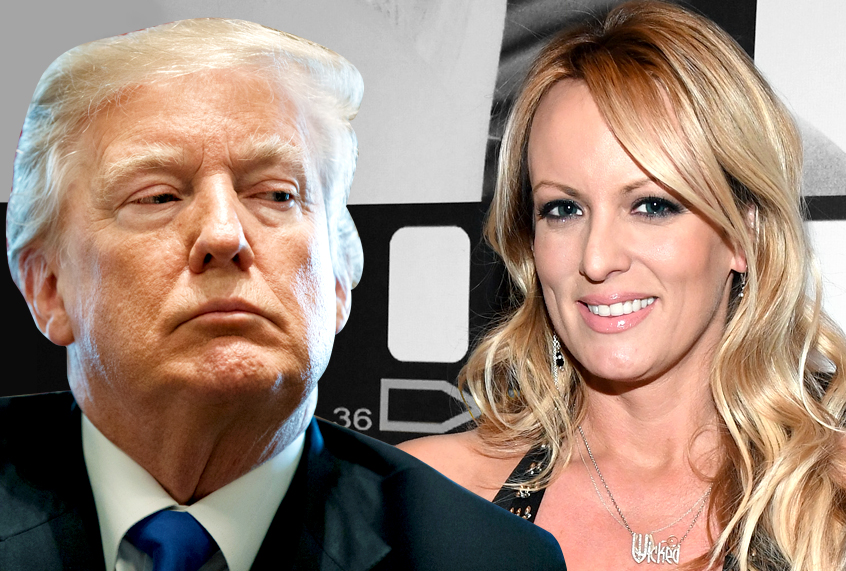Last week the Wall Street Journal reported that a porn actress who works under the name Stormy Daniels (her real name is Stephanie Clifford) received $130,000 of hush money from Donald Trump’s 2016 campaign. Most of the press coverage understandably focused on the most titillating or ridiculous aspects of the story, such as Daniels’ claim that during their 2006 encounter she spanked Trump with a copy of Forbes that featured him and his children on the cover. But the story may have legs beyond another round of hand-wringing about how Trump manages to evade accountability for behavior that would sink any other politician. There’s a good chance that Trump and his minions broke the law in order to cover up the sleaze-in-chief’s adulterous activities.
On Monday, the ethics watchdog group Common Cause filed complaints with both the Federal Election Commission (FEC) and the Department of Justice (DOJ), asking for an investigation into Trump and his campaign for potential violations of campaign finance law regarding this alleged hush-money payoff. Common Cause argues there’s good reason to believe that the campaign violated multiple laws in funneling money to Daniels in hopes of buying her silence.
“The campaign failed to report the $130,000 payment out as an expenditure and it failed to report the source of the $130,000 as an in-kind contribution into the committee,” Paul S. Ryan, Common Cause vice president for policy and litigation, told Salon. “Both are violations of federal campaign finance law disclosure requirements.” (No, this Paul Ryan is not related to the speaker of the House.)
“We’ve already seen the complete disregard for good government and ethics laws by the Trump campaign and administration,” Anne Feldman, the press secretary for End Citizens United, said when asked about the complaint. “This attempt to cover up an embarrassing and politically damaging story appears to be the latest example of Donald Trump skirting election laws.”
Trump’s lawyer, Michael Cohen, apparently paid Daniels off by setting up a shell corporation called Essential Consultants LLC, apparently for the sole purpose of handling this bribe. Even though Cohen used this method to work outside the campaign itself, Ryan argued, the money “was a payment for the purpose for influencing the 2016 presidential election” and therefore the Trump campaign was required to report it as a campaign expenditure. Failure to do so could constitute a violation of campaign finance law and could even be a crime, particularly if Trump or his campaign deliberately hid the expenditure from the FEC.
An even more interesting question is where that money came from. As Ryan pointed out, it’s not just that failure to report the source itself could constitute a violation of the law. The donation itself could be illegal, depending upon its source. If Trump paid the hush money directly from his own pocket, that’s not illegal — candidates have a legal right to spend as much of their own money as they wish running for federal office. But if that money came from the Trump Organization or a third party, that could violate laws preventing corporate donations or donations exceeding strict individual limits to campaigns.
“Our campaign finance laws exist to ensure transparency for the American people, who deserve to know if Trump paid out hush money to keep Stormy Daniels from talking about this relationship, or if an outside benefactor made an illegal in-kind contribution to keep her quiet,” Feldman argued.
The good news is that there’s precedent for exactly this situation. In 2011, John Edwards was indicted on six counts after the DOJ charged that he deliberately tried to evade campaign finance laws by imploring two of his wealthy supporters to pay nearly $1 million to Rielle Hunter, in order to conceal Edwards’ affair with Hunter during the early days of his ill-fated 2008 presidential campaign.
“We will not permit candidates for high office to abuse their special ability to access the coffers of their political supporters to circumvent our election laws,” said assistant attorney general Lanny Breuer at the time.
(Full disclosure: I was interviewed by the FBI about this, as I briefly worked for the Edwards campaign. It was an uneventful interview, since I didn’t know anything about the affair or the payments.)
The Edwards trial ended in one acquittal and mistrials on five other counts, but the whole situation demonstrates that the DOJ, at the very least, does indeed consider hush money paid through outside channels to cover up personal indiscretions as campaign donations. That should make it more difficult for either the FEC or the DOJ to simply brush off the complaint from Common Cause.
The FEC has a legal obligation to vote on whether or not to open an investigation into Trump in response to this complaint. If it fails to open an investigation, Common Cause would then have a legal right to sue. But the hope is that the federal government acts consistently with its approach to the Edwards investigation. If the FEC opens an investigation, all evidence gathered will eventually be made available to the public, so even if Trump faces no legal penalties, the public will potentially find out more about where the $130,000 to pay Daniels off came from.
This story might seem like a footnote to the Trump years, where there’s seemingly no end to the corruption. Certainly, a payoff to a porn actress seems like small potatoes when there’s a larger investigation into the possibility that the Trump campaign conspired with Russian agents to steal emails from the Democratic National Committee and people associated with the Hillary Clinton campaign. But this is also a fairly straightforward case: Money in and money out; it should have been reported and it wasn’t. In its own way, this case opens a modest opportunity for the public to learn more about how exactly the Trump campaign operating during the 2016 elections.
In response to Salon’s inquiry, the FEC said it does not comment on cases until they are resolved.

